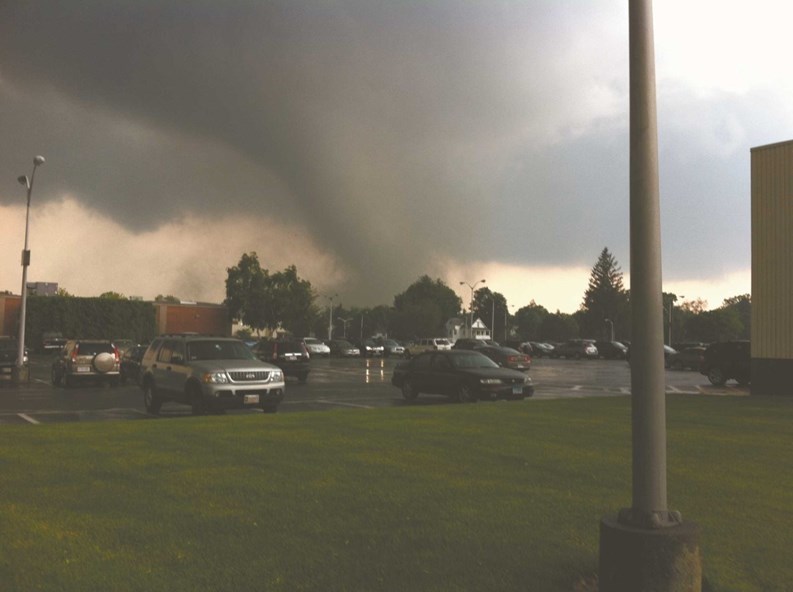Massive flooding. Widespread insect infestations. Devastating tornadoes.
It’s a good thing those things don’t happen in New England.
Condominium trustees and homeowners who thought New England was immune to such catastrophic events have received wake-up calls in recent years. New Hampshire residents haven’t yet forgotten the floodwaters that rushed through their neighborhoods a few years ago. Pest control companies have been battling armies of irritating bedbugs. And just weeks ago, a band of tornadoes left large swaths of Massachusetts’ communities in ruins.
Add to those woes the destructive ice storm of 2008, unrelenting snowfalls of last winter and spiking oil prices of recent months, and association boards may feel they’re rolling the dice when they sit down to develop an annual budget. How can a community prepare for emergencies and the vagaries of nature?
The first step, of course, is to be sure that the property is properly insured. “You have to consider the worst that can happen … a fire, or a tornado, or those coastal tsunamis. You want to be sure you have it right, to make sure you’re adequately insured,” says Chris Snow at Bernier & Snow Insurance Agency in Rochester, New Hampshire.
“There’s always a push and pull between the board, the manager and the insurance company to figure what’s the right number,” he says. “We’re not prone to wildfires like in the west—one fire and you’re gone.” In anticipating the result of catastrophes, one consideration may be that many New England condominium complexes are spread out, so if there is a fire, it’s not likely that the entire community will be lost. But it’s best to be prepared. Surprisingly, some associations look at the short-term cost rather than the potential for disaster. “There was a condo in Florida that elected to drop insurance to save money,” he recalls. “And then it burned down, and they had no insurance.” Fortunately, he says, most associations will use some common sense when it comes to such perils.
“Unexpected” Runs the Gamut
Fires, or devastating tornadoes, though, represent just one end of the “unanticipated expenses” spectrum. “Different situations call for different contingency plans,” says veteran manager Stephen DiNocco, CMCA, AMS, principal of Affinity Realty & Property Management, LLC in Boston. “With snow removal, for example … you budget as realistically as possible, and if things go really bad, you can do a supplemental budget at the end of the year.”
But, he notes, the wise association will plan ahead and expect that at some point, the unanticipated expense will arise. “I encourage associations to put in a contingency reserve, maybe five percent, and build up reserve money for an operating contingency that you didn’t expect. That way, you have some money on hand if it’s needed, and it’s painful only in the first year.”
Associations that have gone that route, he says, “love it. They see that [the contingency fund] is building up and know they have something on hand if it’s needed.” One attraction of the system, he says, is that there’s less likelihood that the board or manager will have to send out notices of a pending special assessment. “Most of my associations have been doing this for quite a while now,” DiNocco says. “Some do five percent, some do less, some do more. It depends on what they feel comfortable with.”
Of course, everyone would rather keep those dollars in their own wallets, he notes, “but for most people, although they’d like to have that money, I don’t think it’s enough to break the bank for them.” Having that rainy day fund set aside, he says, lessened the blow for associations that faced excessive snow removal costs last winter as the region got walloped with back-to-back storms.
“Associations are accustomed to having replacement funds for repair and replacement of things like decks and windows,” says Mark L. Love, a certified public accountant with the central Massachusetts accounting firm of Love, Jarominski & Raymond, LLP. “They understand about putting money away for things you know are going to happen, like needing new pavement.”
But, he says, with the current economy, it can be hard for people to open their wallets to set aside funds for “the unexpected things that might not happen.” Associations, therefore, are facing a balancing act between preparing for the unexpected and waiting for disaster to strike. “The final analysis is, having that reserve is nice, but it increases your condo fee. If you don’t have it, and a catastrophe occurs, it increases your assessment.
“Associations,” Love says, “are pretty much caught in the middle. They all do a very good job caring for at least the replacement portion of the fund, but they’re hard-pressed to set up reserves for the unexpected things.”
Looking beyond the obvious, Snow says that associations today have a wide range of expenses that could appear at any moment. Suppose, for example, that a building does have a fire. It may not destroy the building—but the city or town may say that repairs have to incorporate updated codes for hard-wired carbon monoxide detectors or other safety measures. In fact, if part of a building is destroyed by a fire or other disaster but part is still fine, the municipality may require that the entire building be razed and rebuilt. Insurance coverage for that kind of situation is available, but associations don’t always think about it.
Or ADA (Americans with Disabilities Act) rules may kick in, and an association might have to install a ramp. Having funds tucked away for an unexpected expense can prevent a special assessment for construction to comply with government regulations.
Bedbugs, DiNocco says, can be a budget-buster for associations. “We had an issue with an association that was quite extensive, affecting five units, a whole building.” Getting rid of the nasty critters can cost a couple thousand dollars per unit, he notes. At one association, the initial cost was $1,200 per unit, and the follow-up price was $500 because the exterminators came back every month for a year. “If you’ve got a condominium with 50 units, are you going to have $100,000 put aside somewhere?”
And then, Snow cautions, there are the issues that can be covered by Directors & Officers insurance—if the association has the right policy—or can cost homeowners a ton of cash. He tells the tale of a unit owner who planted trees in the common area next to his unit. The association board told the owner to remove the trees, but he refused. A battle ensued. “When all was said and done,” Snow recalls, “the legal fees were $160,000—and the owners of every unit had to pay $2,000 for the guy’s planting of those trees.” And, he notes, after the legal war ended amid a mountain of expenses, the embattled homeowner, who lost the case but nonetheless cost his neighbors a small fortune, moved out of the condominium.
And even when items are covered by insurance, DiNocco notes, boards will often opt to do the repair or replacement of damages from their reserve fund than put in an insurance claim and possibly raise their premiums down the road.
Be Prepared
Having seen the results—and expenses—of ice and snow storm, flooding and more, New England associations are getting wiser about planning ahead, the experts say.
When news stories point to rapidly rising heating oil prices, boards are weighing the pros and cons of locking in contracts early in the season. “Some of our associations choose not to lock in, and maybe they’ll find that the costs run over budget,” DiNocco said. Other associations have locked into “seasonal” contracts with snow removal companies—which may work for or against the association. They pay a fixed price for the winter, “and whatever it is, it is.” If winter turns out to be light, the contractor comes out ahead; if the snow just keeps coming and coming and coming, the association will benefit.
“A lot of people would rather have the certainty” of a fixed cost, or a regular reserve payment, than face a large and unexpected bill.”
And after last year’s ruling by the Massachusetts Supreme Judicial Court on accumulations of ice and snow—a decision that property managers fear will lead to a surge of “slip and fall” lawsuits, boards are being encouraged to bolster those ice and snow removal accounts. “We’re probably more diligent that we were in years past,” DiNocco says. “On the chance that (melted snow) may refreeze, we’re making sure we clean it away. After the April 1, (2011) snow storm, because of that slip and fall issue, we had trucks come in to plow the roads and clear the sidewalks” despite the likelihood that the springtime snow would disappear quickly.
“There’s been a marked change in the past 10 years,” Love says. “With more professional people buying condos, and people downsizing, the boards today are really well-educated, professional, intelligent, with good business acumen. We find that boards are very strong in all these categories, and we’re seeing much better budgets because they’re thinking about things.”
And when they’re thinking about the budget, they’re thinking about all the “what ifs,” he says. “The risk of the unexpected,” he concludes, “is that you can under-plan, or you can over-plan.” Unfortunately, he says, there’s no magic formula that works for every community.
Pat Gale is associate editor of New England Condominium.







Leave a Comment